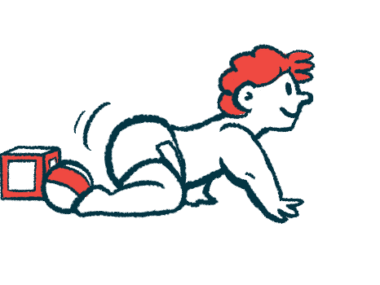The Changes We’ve Seen in My Son Since He Started Nexviazyme
There's been increased energy at play and therapy since new biweekly infusions
Written by |

Infusions of enzyme replacement therapy (ERT) are something my 4-year-old son, Cayden, is used to at this point in his life. He started receiving them when he was just 1 month old, shortly after we got news of his diagnosis of infantile-onset Pompe disease through Pennsylvania’s newborn screening program.
The infusions are necessary for patients with Pompe disease, as they’re the only treatment option available at this time. Previously, Cayden was getting Lumizyme (alglucosidase alfa), which was then the only ERT approved for Pompe by the U.S. Food and Drug Administration (FDA). However, as science and technology advance, more ERT options are becoming available.
Cayden switched over to an infusion recently approved by the FDA, called Nexviazyme (avalglucosidase alfa), at the end of June. Since making the switch, we’ve noticed some changes in him. His physical therapist and I actually had a long talk about them during his at-home physical therapy session last week.
Improvements in sleep, therapy, and speech
One of the biggest changes we’ve seen in Cayden since the switch is that he now has a lot more energy than he did before. He used to be the kind of kid who needed over 12 hours of sleep each night just to make it through the day, and he still took a one-to-two-hour nap most days. However, he now only sleeps 10 or 11 hours overnight and doesn’t want to nap during the day.
Aside from the sleep, his energy levels have been amazing as the day goes on. From the moment he opens his eyes until the time his head hits the pillow at night, he just wants to play all day. He doesn’t want any downtime to rest during the day anymore. He goes from coloring to playing with cars and action figures, to throwing a ball or building a tower with his blocks, all without any breaks in between.
Cayden has also been doing amazing in his physical therapy sessions lately. He’s eager to try most activities the therapist has to offer and doesn’t cry or complain about them. Previously, physical therapy used to tire him out to the point where he needed an hour or two to recover after each session. But now, he has just as much energy after his physical therapy session as he did before it.
Another thing I’ve noticed is that Cayden has been trying to talk a lot more. This could be a coincidence, but I don’t think so. We were hearing him try to use his voice more before the switch, but his words have gotten a lot clearer lately, and he won’t hesitate to copy almost anything you tell him to now. He barely ever wants to use his iPad to voice his wants and needs and is instead trying to use his voice to get these points across. It’s been amazing to hear his little voice more and more.
Lastly, we have noticed that Cayden does a lot better when he has to get his port accessed for the infusions. He used to get nervous and fuss when it was time to access his port, and I can’t blame him. But now, he’s as calm as can be for his port access. I believe the difference in the infusions’ frequency has been a big help. When he was on Lumizyme, he had to receive the infusions once a week. However, Nexviazyme infusions only have to be administered on a biweekly basis.
These changes have been amazing to see. I never imagined that we’d be part of the generation that got to pick between different options for such a rare disease. I can’t wait to see what the future holds for Pompe disease as far as what other treatment options may come. But for now, I’ll sit back and cherish these moments and changes that I’ve noticed in my son since making the switch to Nexviazyme.
Note: Pompe Disease News is strictly a news and information website about the disease. It does not provide medical advice, diagnosis, or treatment. This content is not intended to be a substitute for professional medical advice, diagnosis, or treatment. Always seek the advice of your physician or other qualified health provider with any questions you may have regarding a medical condition. Never disregard professional medical advice or delay in seeking it because of something you have read on this website. The opinions expressed in this column are not those of Pompe Disease News or its parent company, Bionews, and are intended to spark discussion about issues pertaining to Pompe disease.




Sophia Wanitschke
Thanks a ton for sharing your experiences and your daily live with Cayden for such a long time now. Our son is also 4 years old with infantile-onset with a lot of serious infections in the past and it is great to see we are not alone on this special path.
Can you share what dose Cayden receives of Nexviazyme on a bi-weekly basis? We are living in Germany where Nexviazyme just started, so would be great to have a first reference. Thank you!